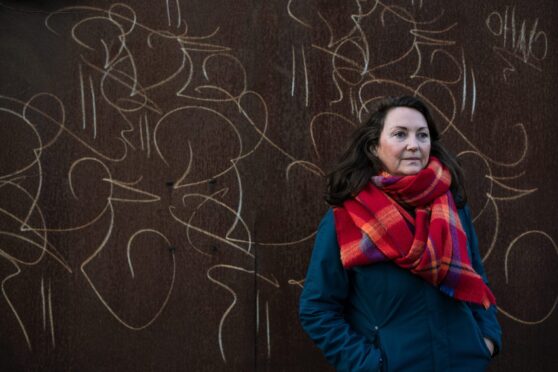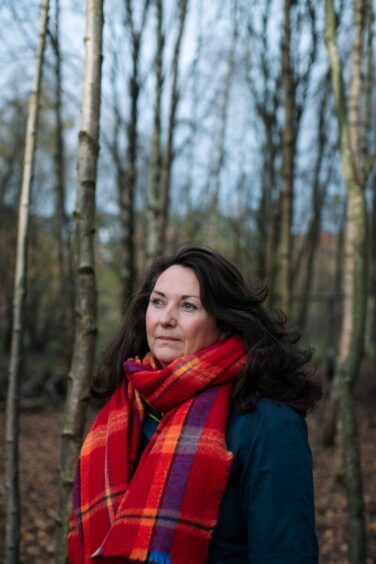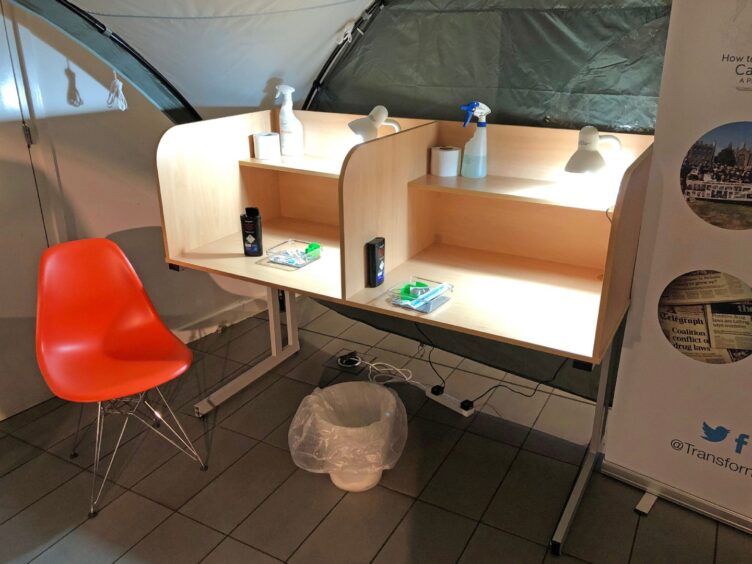
Anti-drugs campaigner Annemarie Ward is stepping back from her frontline battle against substance abuse, in despair at the Scottish Government’s refusal to change its approach.
Ward, an internationally recognised expert and CEO of charity Faces And Voices Of Recovery UK, has for years challenged the Scottish Government’s policy of giving heroin addicts methadone, rather than putting them on a sobriety programme that will lead to them being drug-free.
A former addict herself, who turned her life around through sobriety, she says methadone programmes simply leave addicts trapped in dependency for years, rather than actually tackling their problem.
‘Enough is enough’
Speaking exclusively to The Sunday Post, Ward, 54, said: “I’m done battering my head against a brick wall. I’ve been doing it for five years now. Enough is enough! Nobody in charge is listening.
“I can’t continue shouting against government drug strategies that focus almost entirely on keeping people addicted instead of getting them free from dependency.”
Ward warns methadone, which causes changes to the brain when used long-term, is supposed to be used only to wean addicts off heroin.
She will now focus on promoting sobriety programmes and telling the stories of those who have left addiction behind.
She said: “I believe I can help save more people by celebrating those who have had sobriety for years. We will show that it can be done and how much joy it brings to their own lives, the lives of their families and the communities they live in.”
Ward says the misguided policy is a direct cause of Scotland having the highest drug death rate per head of population in Europe.
Figures published last August showed 1,051 died from drugs in Scotland in 2022, down from 1,330 the year before but still much higher than other countries. More up-to-date figures, showing deaths in 2023, will be published this Tuesday.
Ward, whose attacks on Scottish Government drug policy have been excoriating, believe the real number of drug deaths is far higher, with many death certificates failing to mention the part addiction played.
She said: “They have spent millions creating an addiction industry employing a vast army whose focus is ‘harm reduction’ instead of recovery.
“Every year there’s anger over spiralling drug and alcohol deaths, followed by spurious promises and concern when people like me know the real figures are at least four times higher than official statistics because doctors put medical conditions rather than drugs on death certificates.
“For years I’ve spoken up about the spin, the lies, the pulling the wool over the public’s eyes. I can’t stomach it a moment longer.”
Scotland ‘on the brink’
Ward warned that Scotland is on the brink of a catastrophe due to the emergence of nitazenes and fentanyl – much stronger, more dangerous drugs than ever seen before – mixed into recreational drugs like cocaine and cannabis.
She said: “We’re seeing the effects of this in America and Canada, with unprecedented deaths from drugs 300 times stronger than heroin.
“But, instead of getting people off drugs here in Scotland, we’re busy creating new generations of addicts on the NHS, pushing for decriminalisation and opening consumption rooms, which tacitly endorses the use of hard drugs.
“Methadone, originally developed as a treatment for heroin addiction, is being prescribed to individuals who have never used heroin.
“This includes people seeking help for addiction to substances like cocaine and ketamine.
“Our drug services are no longer fit for purpose when they are leaving addicts on methadone for 40 years.”
Ward baulks at the hundreds of millions of taxpayer cash being spent on “disastrous policies, quangos and government-funded programmes” while people face an almost impossible task to access recovery.
She said: “When told someone is in treatment in Scotland, the public believe they are getting rehab-residential care in a facility dedicated to getting them off drugs.
“But that’s not what we get. Instead, people are kept on medication that often has the same devastating effects as heroin or crack.
“Every year there’s an outcry over drug-death figures followed by wringing of hands by the Government and promises to do better, when people on the frontline like me know the true death toll is four times worse than ‘official figures’ because the cause of death is rarely attributed to drugs.
“Doctors continue to log deaths as heart failure or some other medical condition despite them being caused by addiction.”
Ward added: “I was asked to speak at a police chiefs conference in Lisbon recently, attended by senior officers from all over the world. They were incredulous Scotland is intent on following the same disastrous policies that have ravaged San Francisco, Oregon and Vancouver, where people are openly shooting up on the streets and overdoses are at epidemic levels.
“The evidence of impending disaster is there for all to see, but the Scottish Government continues dragging us down that same path.”
Rehabilitation
Ward has continually challenged Government claims over the investment in rehabilitation services. She said: “They insist we have over 600 rehab beds, but that’s a manipulation. There’s 100 government-funded beds for alcohol and drug addiction at most. Emergency detox, stabilisation, and mental health beds are not long-term rehab beds.
“If a doctor becomes an addict, their colleagues don’t put them on methadone for years. They put them on a proper rehabilitation scheme where they achieve recovery and sobriety. That’s the difference.
“In Scotland the poor get medicated, the rich get recovery.”
Ward says she has grown tired of academics and professionals who perpetuate the narrative that Scotland has a “progressive” drugs policy.
She said: “We have a failed drugs policy. Our drug deaths are three times higher than England’s. Instead of sobriety, people are sold a cheaper medicated treatment pathway that neglects the long-term approach necessary for true recovery.
“Harm reduction and the introduction of drug consumption rooms is an admission, justification and poor defence of a failed system that doesn’t know how to help people get clean and recover.
“And it is usually advocated by those safely insulated from real-world consequences, glossing over the serious issues and detrimental effects such policies have on the most vulnerable and impoverished communities.”
‘Government are following wrong path’
Annemarie Ward founded the charity Faces And Voices Of Recovery UK (Favor UK) in 2013 after recovering from decades of alcohol and drugs taken to medicate herself from the horror of child abuse which started when she was just three years old.
At her lowest ebb, she was taking almost every drug she could get her hands on, including crack and heroin, until she recovered with the support of the 12-step fellowship programme which is free to access and has helped millions around the world achieve sobriety through abstinence.
Born in Saltcoats, Ayrshire, Annemarie put herself through university and has gone on to become one of the most powerful voices in the world advocating for recovery, speaking at conferences across the UK, the US and Europe.
An outspoken critic of the government’s “harm reduction” stance, Annemarie’s charity Favor UK is one of only a handful which has never received a penny funding from the Scottish government.
She said: “Given the Scottish Government’s stubborn refusal to move away from medicating generations of addicts on the NHS, I’m relieved we have not compromised our belief that sobriety is the most effective way to recovery.
“I’ve been clean and sober from alcohol and other drugs for almost 30 years now using the 12-step programmes which have a proven track record of freeing millions from addiction.
“For some unknown reason that has never been explained to me, the Scottish Government have decided to follow a very different path from the one we know works.”
Government measures: £250 million National Mission taking action to save lives
The Scottish Government says it is taking action in the fight against drugs.
A spokesperson said: “Through our £250 million National Mission on drugs we are taking evidence-based measures to reduce harm and save lives. These include widening access to treatment and support through the implementation of our MAT standards, increasing the availability of residential rehabilitation, supporting the opening of a Safer Drug Consumption Facility pilot, widening access to Naloxone and delivering drug-checking facilities. The Home Office is currently considering licence applications for three drug-checking pilots in Glasgow, Aberdeen and Dundee.
“According to a recent PHS report, the upward trend in placements suggests we’re on track to hit the target of 1,000 people publicly funded to go to rehab by 2026. We have set out a clear definition of what counts as residential rehabilitation and used it consistently.
“We’re also working hard to respond to the growing threat from highly dangerous, super-strong synthetic opioids like nitazenes in an increasingly toxic and unpredictable drug supply. Such synthetics, which increase the risk of overdose, hospitalisation and death, are being found in a range of substances.”
Beating addiction: Millions globally take 12 steps to sobriety
Millions around the world have found sobriety from alcohol and other drugs by following 12-step fellowship-style programmes which have been around for almost 100 years.
Alcoholics Anonymous first published the 12-step programme in the early-1930s, and one of the first things a person is encouraged to do is admit they cannot control their addiction.
The programme has been successfully used to help people addicted to all kinds of substance abuse, gambling, shopping and eating.
The 12 steps include acceptance, trust, liberation, understanding acknowledgement, freedom, growth, reflection, forgiveness, continuity, connection and helping others.
Those who have completed the programme emerge with a new ability to manage the thought patterns that contribute to maintaining recovery and sobriety.
The programme also encourages making amends with people who have been hurt by their substance abuse and addictive behaviour.

Enjoy the convenience of having The Sunday Post delivered as a digital ePaper straight to your smartphone, tablet or computer.
Subscribe for only £5.49 a month and enjoy all the benefits of the printed paper as a digital replica.
Subscribe © Andrew Cawley
© Andrew Cawley